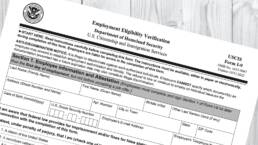The Department of Homeland Security recently announced that due to the physical proximity complications associated with COVID-19, DHS will exercise discretion to defer the physical requirements associated with Form I-9. Employers with employees working remotely due to COVID-19 will not be required to review the employee’s identity and employment authorization documents in the employee’s physical presence.
However, employers must still inspect the documents listed in Section 2 of the form remotely, for example by email, fax, or video-chat and must also obtain, inspect, and retain copies of the documents within three business days for purposes of completing Section 2. Employers should also enter “COVID-19” as the reason for the physical inspection delay once physical inspection takes place after normal operations have resumed. Once the documents have been physically inspected, the employer should be sure to add “documents physically examined” with the date of inspection to Section 2 or Section 3 of the form as appropriate. These exceptions may be implemented by employers for a period of 60 days from the announcement of DHS (March 20, 2020) or within three business days after the termination of the National Emergency, whichever comes first.
Employers who use this option must provide written documentation of the remote onboarding and telework policy for each employee. This burden rests solely on the employer. Once normal operations resume, all employees who were onboarded using remote verification must report to their employer within three business days for in-person identity verification and employment eligibility documentation for Form I-9. Any audit of subsequent Form I-9s would use the “in-person completed date” as a starting point for these employees only.
These provisions only apply to employers and workplaces that are operating remotely. If there are employees physically present at a work location, no exceptions are being made at this time for in-person verification of identity and employment eligibly documentation for Form I-9. However, if newly hired employees or existing employees are subject to COVID-19 quarantine or lockdown protocols, DHS will evaluate on a case-by-case basis.
Additionally, employers may designate an authorized representative to act on their behalf to complete Section 2. An authorized representative can be any person the employer designates to complete and sign the form on their behalf. The employer is liable for any violations in connection with the form or the verification process, including any violations of the employer sanction laws committed by the person designated to act on the employer’s behalf.
Effective as of March 19, 2020, any employers who were served a Notice of Inspection (NOI) and have not already responded, will be granted an automatic extension for 60 days from the effective date. At the end of the 60-day extension, DHS will determine if an additional extension may be granted.
DHS will continue to monitor the ongoing National Emergency and provide updated guidance as needed. Employers are required to monitor DHS and ICE websites for additional updates regarding when the extensions will be terminated, and normal operations resumed.
If you have questions on Form I-9 compliance during this National Emergency, be sure to contact Berardi Immigration Law to speak to one of our attorneys today.
Related Posts
February 12, 2026
Understanding B-1 Business Visitor Status: What You Can and Can’t Do
February 10, 2026
Webinar: “Trump 2.0: Tuesday Updates With Guest Zach Ahlstrom”
Ready to have Berardi on your side?
Whether you’re a business looking to hire or a professional hoping to relocate, immigration law can be complicated. But you don’t have to do it alone. Put our experience to work for you.



